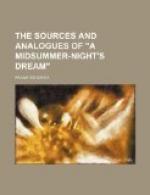On a time his master had a gown to make for a woman, and it was to be done that night: they both sat up late so that they had done all but setting on the sleeves by twelve o’clock. This master then being sleepy said, “Robin, whip thou on the sleeves, and then come thou to bed; I will go to bed before.” “I will,” said Robin. So soon as his master was gone, Robin hung up the gown, and taking both sleeves in his hands, he whipped and lashed them on the gown. So stood he till the morning that his master came down: his master seeing him stand in that fashion asked him what he did? “Why,” quoth he, “as you bid me, whip on the sleeves.” “Thou rogue,” said his master, “I did mean that thou shouldst have set them on quickly and slightly.” “I would you had said so,” said Robin, “for then had I not lost all this sleep.” To be short, his master was fain to do the work, but ere he had made an end of it, the woman came for it, and with a loud voice chafed for her gown. The tailor, thinking to please her, bid Robin fetch the remnants that they left yesterday (meaning thereby meat that was left); but Robin, to cross his master the more, brought down the remnants of the cloth that was left of the gown. At the sight of this, his master looked pale, but the woman was glad, saying, “I like this breakfast so well, that I will give you a pint of wine to it.” She sent Robin for the wine, but he never returned again to his master.
WHAT HAPPENED TO ROBIN GOOD-FELLOW AFTER HE WENT FROM THE TAILOR
After Robin had travelled a good day’s journey from his master’s house he sat down, and being weary he fell asleep. No sooner had slumber taken full possession of him, and closed his long-opened eyelids, but he thought he saw many goodly proper personages in antic measures tripping about him, and withal he heard such music as he thought that Orpheus, that famous Greek fiddler (had he been alive), compared to one of these, had been as infamous as a Welsh harper that plays for cheese and onions. As delights commonly last not long, so did those end sooner than he would willingly they should have done; and for very grief he awaked, and found by him lying a scroll, wherein was written these lines following in golden letters.
Robin, my only son and heir,
How to live take thou no care:
By nature thou hast cunning shifts,
Which I’ll increase with other gifts.
Wish what thou wilt, thou shalt it have;
And for to vex both fool and knave,
Thou hast the power to change thy shape,
To horse, to hog, to dog, to ape.
Transformed thus, by any means
See none thou harm’st but knaves
and queans;
But love thou those that honest be,
And help them in necessity.
Do thus, and all the world shall know
The pranks of Robin Good-fellow;
For by that name thou called shalt be
To age’s last posterity.
If thou observe my just command,
One day thou shalt see Fairy Land.
This more I give: who tells thy pranks
From those that hear them shall have thanks.




